 Before we begin with this week's Supporting Actress profile, it's worth noting that its featured performer is the reason we're going to 1955 this November. See, a couple months ago, MrStinky and I happened to catch a Susan Hayward vehicle (1955's I'll Cry Tomorrow) one Saturday afternoon on TCM. The film -- a "behind the music"-style narrative account of singer-actress Lillian Roth's gaudy descent in to gutter drunkenness and back -- featured a vivid, captivating performance by some vaguely familiar actress as Roth's desperately manipulative stage mother. Of course, StinkyLulu was all: who's that freakydeaky actress at the edges of I'll Cry Tomorrow? Turns out, 'twas the Best Supporting Actress winner that year, only for another little 1955 film, which brings us to...
Before we begin with this week's Supporting Actress profile, it's worth noting that its featured performer is the reason we're going to 1955 this November. See, a couple months ago, MrStinky and I happened to catch a Susan Hayward vehicle (1955's I'll Cry Tomorrow) one Saturday afternoon on TCM. The film -- a "behind the music"-style narrative account of singer-actress Lillian Roth's gaudy descent in to gutter drunkenness and back -- featured a vivid, captivating performance by some vaguely familiar actress as Roth's desperately manipulative stage mother. Of course, StinkyLulu was all: who's that freakydeaky actress at the edges of I'll Cry Tomorrow? Turns out, 'twas the Best Supporting Actress winner that year, only for another little 1955 film, which brings us to...approximately 15 minutes and 31 seconds
6 scenes
roughly 13% of film's total running time
6 scenes
roughly 13% of film's total running time
Jo Van Fleet plays Kate, the mysterious proprietor of the most successful bawdy house on the northern California coastal town of Monterey, on just the other side of the mountain from Salinas where Cal (James Dean) has grown up with his "widowed" father Adam and perfect twin brother, Aron.
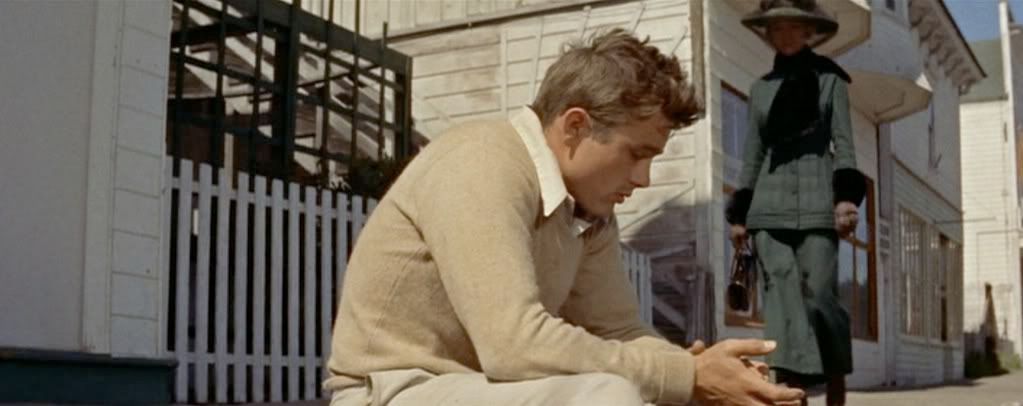 In the film's opening scenes, Cal ghosts Kate from center of town to the complex of bars and brothels she runs just on its outskirts. As the scenes unfold, it becomes clear (to both Van Fleet's Kate and the audience) that the young man stalks Kate for reasons greater than an idly titillating thrill. Concerned, Kate has Cal removed from the property as she watches, concealed, behind a lace curtain.
In the film's opening scenes, Cal ghosts Kate from center of town to the complex of bars and brothels she runs just on its outskirts. As the scenes unfold, it becomes clear (to both Van Fleet's Kate and the audience) that the young man stalks Kate for reasons greater than an idly titillating thrill. Concerned, Kate has Cal removed from the property as she watches, concealed, behind a lace curtain.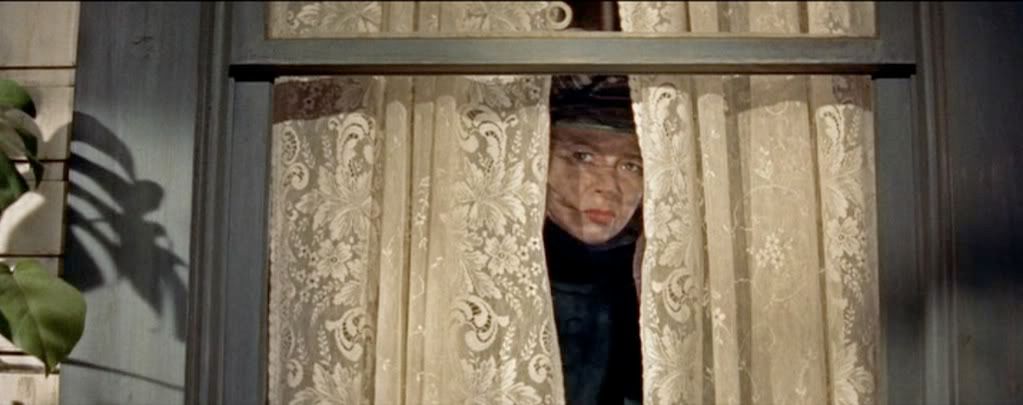 But Cal comes back later that night. And, with the help of a skittish bar wench (an impossibly young Lois Smith in a palpably thrilling cameo), Cal makes his way to Kate's private office, where he kneels before her, begging her to speak to him, only to be expelled violently when she groggily awakens from her stupor.
But Cal comes back later that night. And, with the help of a skittish bar wench (an impossibly young Lois Smith in a palpably thrilling cameo), Cal makes his way to Kate's private office, where he kneels before her, begging her to speak to him, only to be expelled violently when she groggily awakens from her stupor.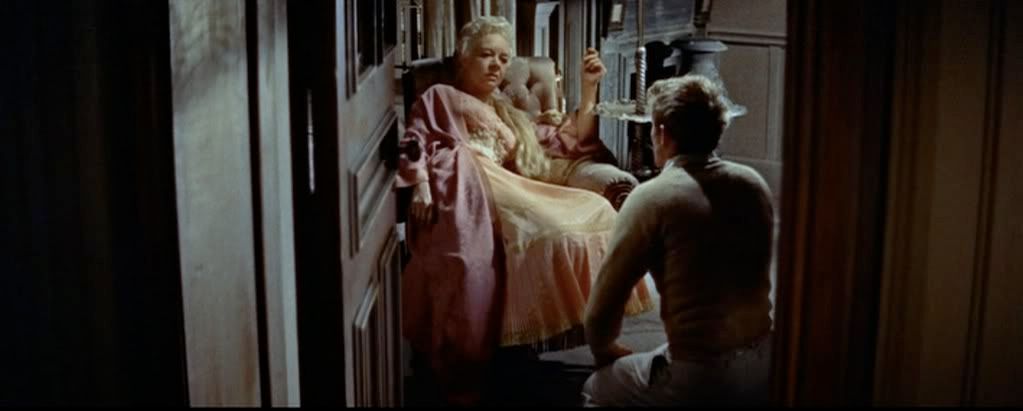 As her heavies expel a weeping and shrieking Cal from her property for the second time in a single day, Van Fleet's Kate finally reconciles how she recognizes this young man: he's her son, one of the infant boys she abandoned nearly two decades earlier...
As her heavies expel a weeping and shrieking Cal from her property for the second time in a single day, Van Fleet's Kate finally reconciles how she recognizes this young man: he's her son, one of the infant boys she abandoned nearly two decades earlier...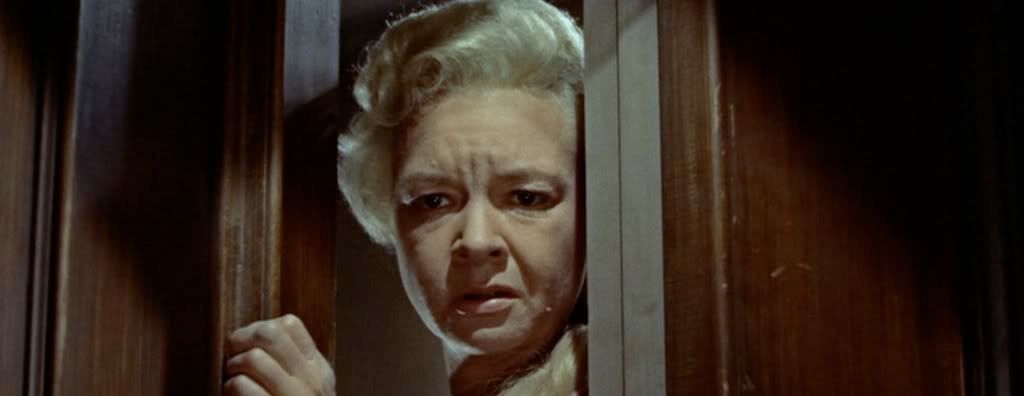 Such is the lurid, ominous, monstrous maternal mystery constructed by Elia Kazan, James Dean and Jo Van Fleet for the character of Kate. Van Fleet's Kate is the missing piece at the center of Cal's soul and the film asks the question: now that Cal knows his own dark secret, what will he make from it? For her part, Van Fleet's Kate offers few answers. Her presence in the film is both marginal and central. In her first and last scenes, Van Fleet's Kate is mostly silent -- she's a lurid primal symbol of maternal mystery and Freudian horror. Only her extended middle scene, situated precisely at the film's midpoint and in which Van Fleet's Kate speaks a little about everything, permits the character to manifest as more than a psychoanalytic archetype.
Such is the lurid, ominous, monstrous maternal mystery constructed by Elia Kazan, James Dean and Jo Van Fleet for the character of Kate. Van Fleet's Kate is the missing piece at the center of Cal's soul and the film asks the question: now that Cal knows his own dark secret, what will he make from it? For her part, Van Fleet's Kate offers few answers. Her presence in the film is both marginal and central. In her first and last scenes, Van Fleet's Kate is mostly silent -- she's a lurid primal symbol of maternal mystery and Freudian horror. Only her extended middle scene, situated precisely at the film's midpoint and in which Van Fleet's Kate speaks a little about everything, permits the character to manifest as more than a psychoanalytic archetype.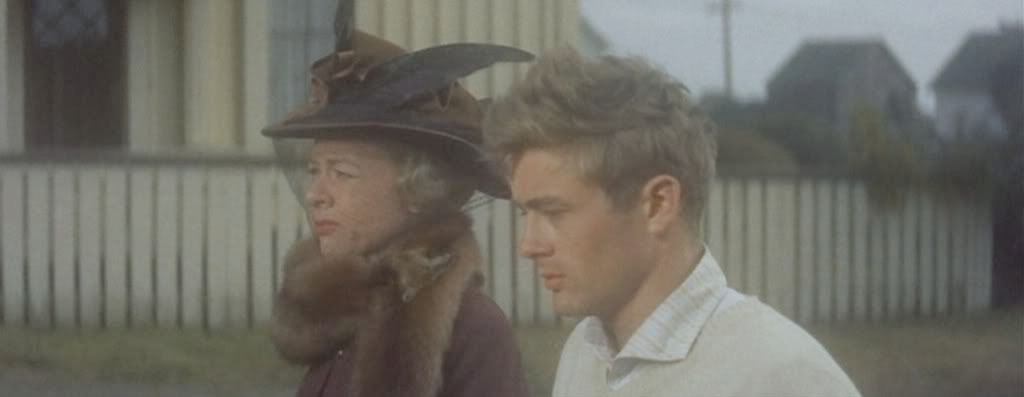 In these scenes, in which Cal arrives to ask his mother for a business loan, they chat, first on a foggy path and then in Kate's office. With feints and barbs, the characters warily begin to know each other. Remarkably, this scene -- which threatens to be a method-acting twitchfest (both Van Fleet and Dean love their bits of business) -- develops as the film's single extended scene of quiet, inquisitive tenderness.
In these scenes, in which Cal arrives to ask his mother for a business loan, they chat, first on a foggy path and then in Kate's office. With feints and barbs, the characters warily begin to know each other. Remarkably, this scene -- which threatens to be a method-acting twitchfest (both Van Fleet and Dean love their bits of business) -- develops as the film's single extended scene of quiet, inquisitive tenderness.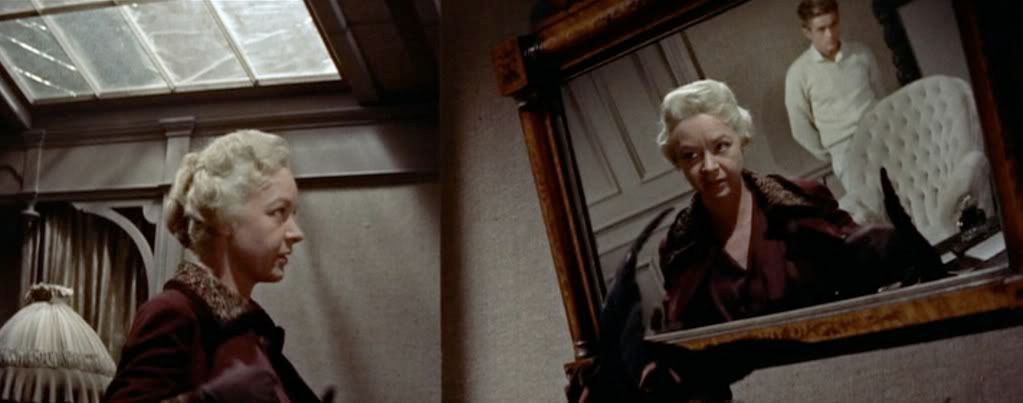 As the scene plays, with the characters maneuvering the details of Cal's scheme, Kate and Cal each discover a curious comfort in the other. Cal/Dean's open-soul vulnerability somehow cracks Kate/Van Fleet's world-weary crustiness and each recognizes the other's devastating loneliness as if in a mirror. That simple recognition buoys each of their spirits.
As the scene plays, with the characters maneuvering the details of Cal's scheme, Kate and Cal each discover a curious comfort in the other. Cal/Dean's open-soul vulnerability somehow cracks Kate/Van Fleet's world-weary crustiness and each recognizes the other's devastating loneliness as if in a mirror. That simple recognition buoys each of their spirits.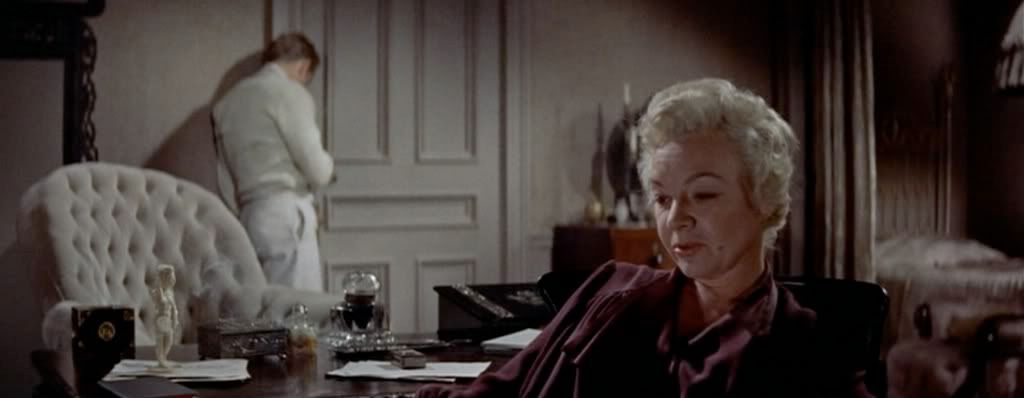 In a gesture of uncharacteristically admirable restraint, Kazan allows Van Fleet and Dean to hold their magnetic distance throughout the scene, never really permitting the one to touch the other, creating instead an exceptionally delicate and tender scene between two incredibly prickly char/actors. (Elsewhere in the film, Dean is an angsty bundle of emotional mess but, with Van Fleet, he showcases the luminous simplicity of his formidable but odd gifts as a screen actor. It's just dreamy to watch Dean in this scene.) The tender, wary distance that Dean and Van Fleet hold with the other showcases each character's damage while also constructing this new relationship as something almost immediately, elementally sacred.
In a gesture of uncharacteristically admirable restraint, Kazan allows Van Fleet and Dean to hold their magnetic distance throughout the scene, never really permitting the one to touch the other, creating instead an exceptionally delicate and tender scene between two incredibly prickly char/actors. (Elsewhere in the film, Dean is an angsty bundle of emotional mess but, with Van Fleet, he showcases the luminous simplicity of his formidable but odd gifts as a screen actor. It's just dreamy to watch Dean in this scene.) The tender, wary distance that Dean and Van Fleet hold with the other showcases each character's damage while also constructing this new relationship as something almost immediately, elementally sacred.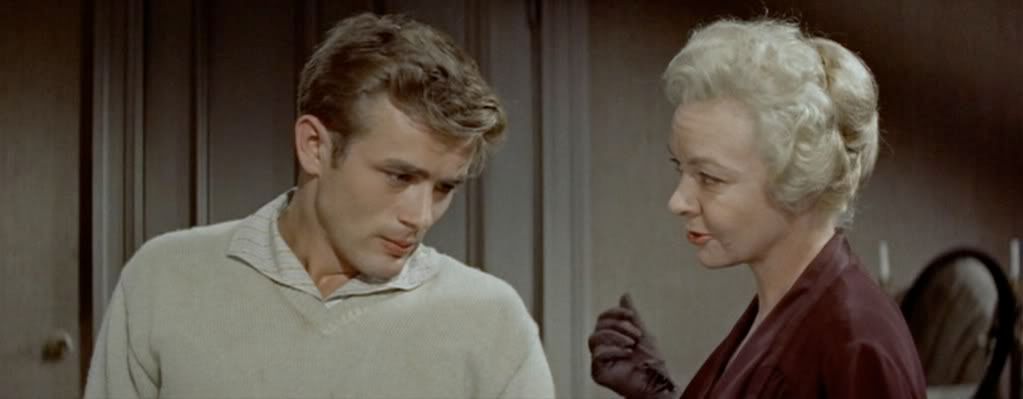 Which makes it all the more devastating when Cal, in a fit of wounded rage, stages a vengeful introduction between Kate and her other son, the naively righteous Aron.
Which makes it all the more devastating when Cal, in a fit of wounded rage, stages a vengeful introduction between Kate and her other son, the naively righteous Aron.In this jagged scene -- Kate's final one in the film -- Van Fleet conveys in a quick series of nearly wordless glances how much her new relationship with Cal has meant to Kate and how devastating his viciousness is. It's a vivid, mortifying scene of anguished betrayal and Van Fleet anchors it with palpable despair.
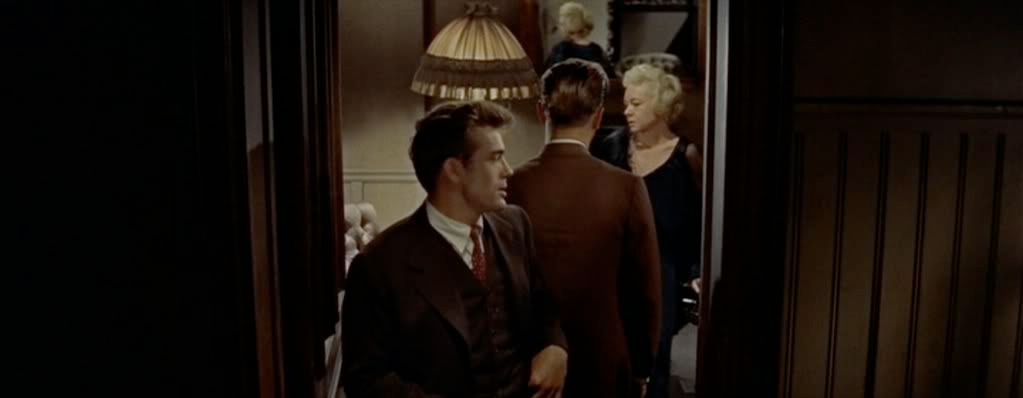 Van Fleet work as Kate is vivid, meticulous, and memorable, somehow actressy and elemental all at once. Perhaps as a result, Van Fleet's Kate haunts both the film itself and my recollections of it, in great excess of her nominal screen time.
Van Fleet work as Kate is vivid, meticulous, and memorable, somehow actressy and elemental all at once. Perhaps as a result, Van Fleet's Kate haunts both the film itself and my recollections of it, in great excess of her nominal screen time.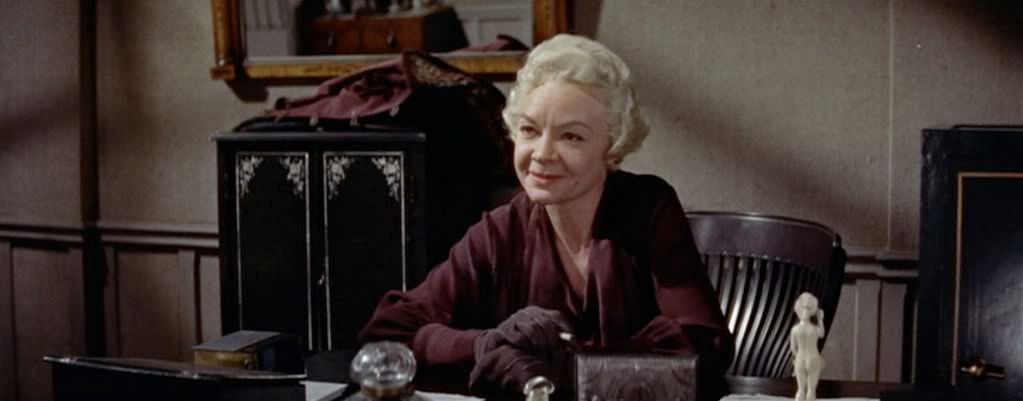 Yet, I didn't love the perf, and find it frankly shocking Van Fleet snagged the trophy with it. The conundrum brings me back to her work in I'll Cry Tomorrow, Van Fleet's monstrous mother there being an equally vivid but also distinct complement to her work here. And I find myself wondering: as I'll Cry Tomorrow gave Van Fleet a bigger role and bigger box office, might her success there have fortified her artier, baitier success here?
Yet, I didn't love the perf, and find it frankly shocking Van Fleet snagged the trophy with it. The conundrum brings me back to her work in I'll Cry Tomorrow, Van Fleet's monstrous mother there being an equally vivid but also distinct complement to her work here. And I find myself wondering: as I'll Cry Tomorrow gave Van Fleet a bigger role and bigger box office, might her success there have fortified her artier, baitier success here?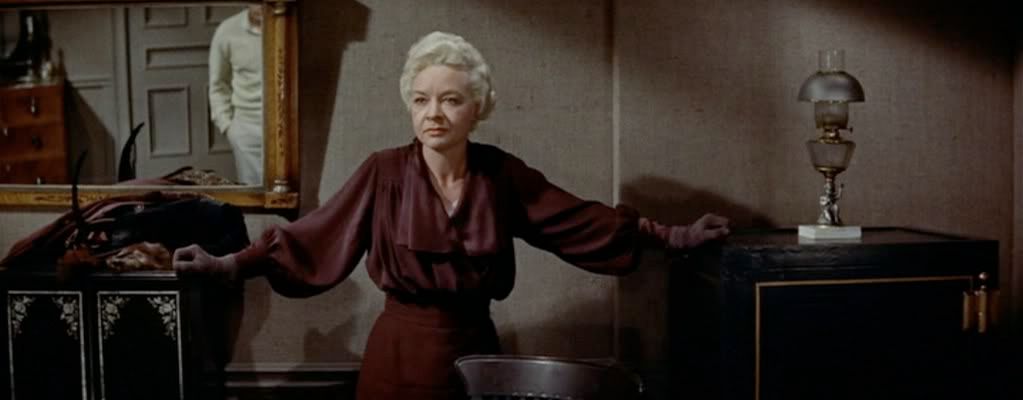 It's always an interesting question -- whether/when an actress's win notes the singular achievement represented by the nominated performance, and whether/when it's a more accretive accomplishment -- a question raised, but certainly not answered by, Van Fleet's memorable turn in this iconic film.
It's always an interesting question -- whether/when an actress's win notes the singular achievement represented by the nominated performance, and whether/when it's a more accretive accomplishment -- a question raised, but certainly not answered by, Van Fleet's memorable turn in this iconic film.

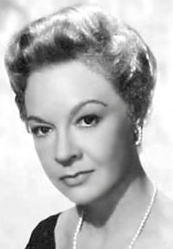
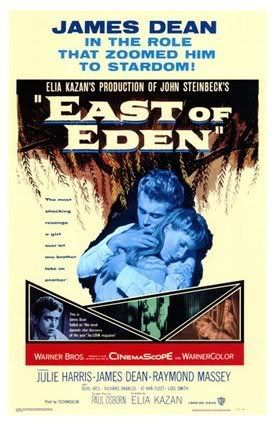
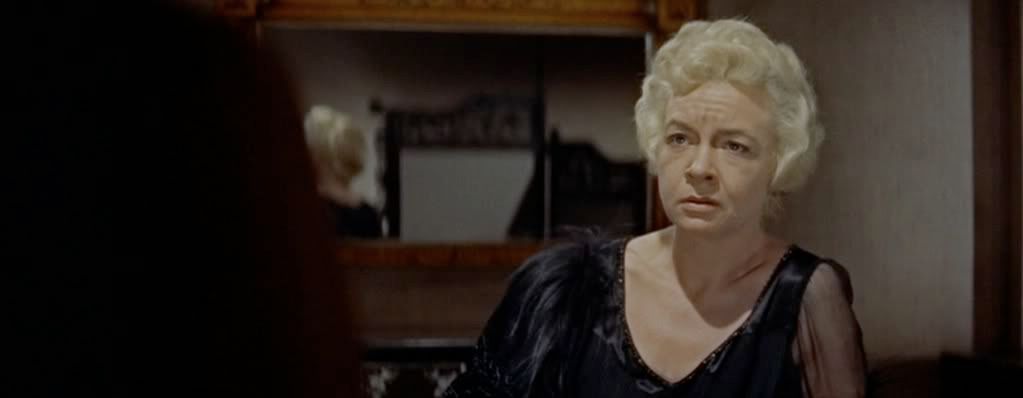
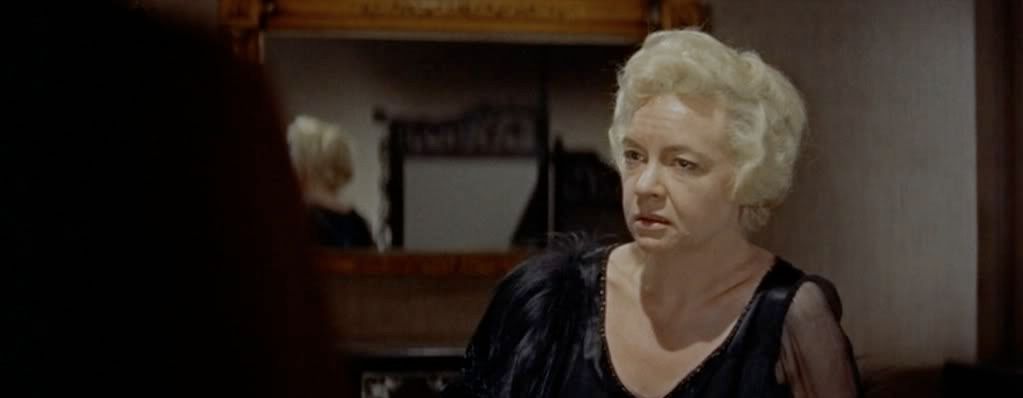
1 comment:
A final factor in this equation- Van Fleet's brief but trenchant role as a nasty busybody who gives 1955's Best Actress winner Anna Magnani a hard time in The Rose Tattoo. Van Fleet definitely had one of the greatest film debut years for any supporting actress, but I find the situation surrounding her win similar to what happened to Gloria Grahame after her 1952 output, when she had The Bad and the Beautiful, Greatest Show on Earth, and Sudden Fear all on her resume (she’s also in Macao, but isn’t given a chance to really stand out). Grahame’s good in all three films, and probably at her best as Fear’s calculating bitch, but none of the roles match Jean Hagen’s incredible performance in Singin’ in the Rain (Gloria is in-and-out of Beautiful damn fast, with several good moments to her credit, but none that are Oscar-worthy highlights). Grahame’s work in 1953’s The Big Heat is also superior to her Oscar role but, of course, she was overlooked at Oscar time for her best performance.
At least with Fleet, I believe the right performance was chosen when the honors rolled around (she’s interesting to watch in I’ll Cry Tomorrow, but I think her Kate packs a lot more conviction and, possibly due the character’s many quiet moments, Fleet doesn’t appear to “act up”- or overact- as much as she does in the Hayward picture). I’m not sure if Fleet was the Best in Show that year, but I can’t remember any of her co-nominees’ being head and shoulders above her work, either. I admire the1955 bunch, but I can’t work up much enthusiasm for any of the performances, although I find Betsy Blair’s ultra-drab wallflower in Marty the most touching and memorable portrayal in this field.
Post a Comment